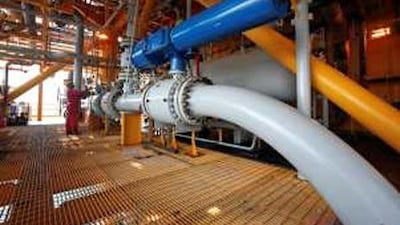The region's economic outlook has improved with the return of capital and stronger oil prices, the IMF said yesterday. But lingering pressures in the banking and financial sectors combined with slow credit activity were weighing on recovery, the fund warned in its latest economic report on the MENA region.
"The outlook for the region has improved considerably from 2009," said Masood Ahmed, the director of the IMF's Middle East and Central Asia department. "Growth is gathering momentum in 2010, helped by the pickup in capital inflows and resurgence in domestic consumption. However, this positive perspective is clouded by some stress in the banking system and lethargic credit activity across the region."
Higher oil prices and crude output were projected to boost the current accounts of the region's oil exporters, such as the UAE, to an aggregate US$140 billion (Dh513.8bn) after an 85 per cent decline to $53bn last year from the level in 2008. The IMF expects the share of GDP generated from oil-related activities to rise to 4.3 per cent this year, reversing last year's decline of 4.7 per cent triggered by falling oil prices.
Although prices have declined in recent weeks to about $70 a barrel, they are still more than double the prices at the depth of the global financial crisis. Activity in the non-oil sector in the region, supported by sustained fiscal stimulus in some countries, was forecast to grow by 4.1 per cent this year, the IMF said. Counter-cyclical public expenditure measures helped the region's non-oil sector to expand by 3.6 per cent last year.
"The region's oil exporters still face challenges in their banking systems, however, where credit to the private sector remains sluggish and losses on non-performing loans have yet to be fully recognised," Mr Ahmed said. Banks have remained reluctant to lend to businesses after their exposure to the troubled multibillion-dollar debts of several conglomerates in the Gulf. UAE banks are expected to receive guidance from the Central Bank on levels of provisioning they will have to provide after the state-owned conglomerate Dubai World reached a $23.5bn debt restructuring deal with its core lenders last week.
Defaults on corporate loans at two Saudi conglomerates, the Saad Group and Ahmad Hamad Al Gosaibi and Brothers, have still to work their way through the financial system completely, analysts say. After an extended period of high credit growth until the middle of 2008, credit in oil-exporting countries slowed by an average of almost 30 per cent by the end of last year. Governments would have to balance the aim of reigniting credit with the need to bolster financial regulations and improve supervision, particularly in countries where excessive risk taking occurred, the IMF said.
Policymakers also faced a delicate balancing act in withdrawing official support from the financial sector and in phasing out the fiscal stimulus. "It is important that the stimulus is kept for as long as needed to help domestic demand," Mr Ahmed said. "But beyond 2010, the measures should be gradually unwound to avoid additional fiscal pressures, in particular for countries that already have high levels of debt."
@Email:tarnold@thenational.ae

